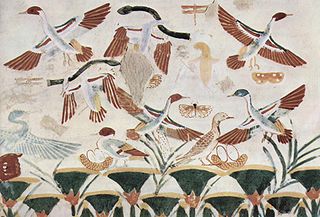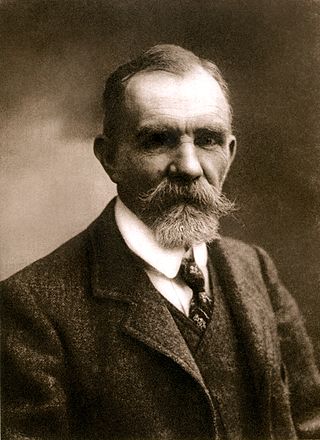
Aquatint is an intaglio printmaking technique, a variant of etching that produces areas of tone rather than lines. For this reason it has mostly been used in conjunction with etching, to give both lines and shaded tone. It has also been used historically to print in colour, both by printing with multiple plates in different colours, and by making monochrome prints that were then hand-coloured with watercolour.

John Gould was an English ornithologist who published monographs on birds, illustrated by plates produced by his wife, Elizabeth Gould, and several other artists, including Edward Lear, Henry Constantine Richter, Joseph Wolf and William Matthew Hart. He has been considered the father of bird study in Australia and the Gould League in Australia is named after him. His identification of the birds now nicknamed "Darwin's finches" played a role in the inception of Darwin's theory of evolution by natural selection. Gould's work is referenced in Charles Darwin's book, On the Origin of Species.

Louis Pierre Vieillot was a French ornithologist.

John Latham was an English physician, naturalist and author. His main works were A General Synopsis of Birds (1781–1801) and General History of Birds (1821–1828). He was able to examine specimens of Australian birds which reached England in the last twenty years of the 18th century, and was responsible for providing English names for many of them. He named some of Australia's most famous birds, including the emu, sulphur-crested cockatoo, wedge-tailed eagle, superb lyrebird, Australian magpie, magpie-lark and pheasant coucal. He was also the first to describe the hyacinth macaw. Latham has been called the "grandfather" of Australian ornithology.

The following is a timeline of ornithology events:

Johannes Gerardus Keulemans was a Dutch bird illustrator. For most of his life he lived and worked in England, illustrating many of the best-known ornithology books of the nineteenth century.

Johann Georg Wagler was a German herpetologist and ornithologist.
The year 1896 in art involved some significant events.

Eugène Louis Simon was a French naturalist who worked particularly on insects and spiders, but also on birds and plants. He is by far the most prolific spider taxonomist in history, describing over 4,000 species.
Pierre-Médard Diard was a French naturalist and explorer.

The red-billed pied tanager is a species of bird in the family Mitrospingidae. It is found in Bolivia, Brazil, French Guiana, Guyana, Peru and Suriname. Placed in family Thraupidae, the "true" tanagers, for over two centuries, the International Ornithological Committee reclassified this species to Mitrospingidae in 2018.

Jacob Christian Schäffer, alternatively Jakob, was a German dean, professor, botanist, mycologist, entomologist, ornithologist and inventor.

The rufous crab hawk or rufous crab-hawk, is a Near Threatened species of bird of prey in subfamily Accipitrinae, the "true" hawks, of family Accipitridae. It is found on Trinidad and along the South American coastline from eastern Venezuela to southern Brazil.

The paradise drongo or ribbon-tailed drongo is a species of bird in the family Dicruridae. It is endemic to New Ireland in the Bismarck Archipelago, Papua New Guinea. With a total length of 51 to 63 cm and body mass of 130 g (4.6 oz), this may be the largest species of drongo.

The white-breasted robin is a passerine bird in the Australasian robin family Petroicidae and the yellow robin genus Eopsaltria. Occasionally it is placed in the genus Quoyornis Mathews, 1912. It is endemic to southwestern Australia. Unlike many other Australian robins, it lacks bright colours in its plumage, being a predominantly greyish bird with white underparts. Like other closely related Australasian robins, it is a cooperative breeder. It is sedentary, with pairs or small groups maintaining territories.

The hooded monarch is a species of bird in the family Monarchidae. It is found on New Guinea. Its natural habitat is subtropical or tropical moist lowland forests.

A History of British Birds is a natural history book by Thomas Bewick, published in two volumes. Volume 1, Land Birds, appeared in 1797. Volume 2, Water Birds, appeared in 1804. A supplement was published in 1821. The text in Land Birds was written by Ralph Beilby, while Bewick took over the text for the second volume. The book is admired mainly for the beauty and clarity of Bewick's wood-engravings, which are widely considered his finest work, and among the finest in that medium.

A Century of Birds from the Himalaya Mountains was an ornithological book published by John Gould between 1830 & 1832.

















